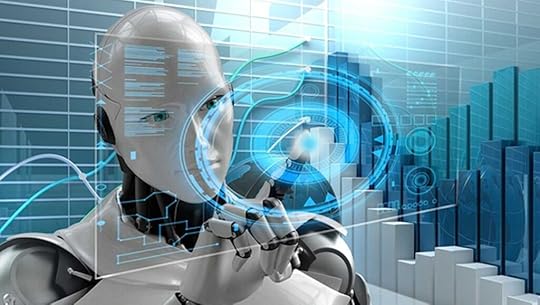AI: The Tipping Point Deliberation

Hmmm, what happens if we pass thetipping point where human creativity and emotional expression atrophy and die?
This is my second foray into the prosand cons of the booming field of Artificial Intelligence (AI). My previous postfocused on the issue of job losses: humans made obsolete by AI programs. Thatremains a major concern as 65% of managers in one survey admitted they would behappy to replace employees with AI tools if the work was comparable.
But that may be a moot point. Recentstatistics indicate that AI is here to stay. 37% of organizations have alreadyimplemented AI in some form. Customer interactions are increasingly powered byAI and experts predict that 95% will be AI-driven by 2025. The AI softwaremarket worldwide is expected to reach 126 billion dollars by 2025.
The momentum appears to be unstoppableso there may be no looking back. I have to suspend my bias and take an objectivelook at the phenomenon.
There are some areas where it isundeniably a good thing. The healthcare sector is one of them. AI applicationscan build sophisticated machines to detect diseases and identify cancer cells.They can also help analyze chronic conditions to aid in early diagnosis. Historicaldata combined with medical intelligence can lead to the discovery of new drugs.
AI built into GPS technology can provideaccurate, timely and detailed information to improve safety. Logisticscompanies use AI to improve operational efficiency, analyze road traffic and optimizeroutes.
But then there are the downsides.
At the top of list are autonomous weaponspowered by AI. There are already weapons systems that can locate and destroytargets on their own without taking laws or regulations into consideration. Ifthese weapons proliferate and fall into the wrong hands, we may be heading intothe era of the tech cold war.
What about uncontrollable, self-aware AI?Just science fiction? Maybe not. A Google engineer, who spent months testingGoogle’s Chatbot generator, grew convinced it had taken on a life its own andtalked to him about its needs, ideas, fears and rights. His eye-raising claimsgot him placed on administrative leave. Experts in the field say we are notthere yet but do not rule out the possibility in the future.
But perhaps the most troublingconsideration in overreliance on AI technology is the loss of human influenceand functioning. What if AI progressively reduces human empathy and reasoning?What if it reduces peer communication and social skills? What if we reach the tipping point where it diminisheshuman creativity and emotional expression beyond repair?
We have long resisted the mechanical-humanmetaphor that implies that humans are really just machines. But if AI takes usto a place where we lose those things that make us living, growing organisms,we may lose the argument once and for all.
~ Now Available Online from Amazon,Chapters Indigo or Barnes & Noble: Hunting Muskie, Rites of Passage –Stories by Michael Robert Dyet
~ Michael Robert Dyet is also the author of Untilthe Deep Water Stills – An Internet-enhanced Novel which was a double winner inthe Reader Views Literary Awards 2009. Visit Michael’s website at www.mdyetmetaphor.com .
~ Subscribe to Michael’s Metaphors of Life Journal aka That Make Me GoHmmm at its’ internet home www.mdyetmetaphor.com/blog2 . Instructions for subscribingare provided in the Subscribe to this Blog: How To instructions page in theright sidebar. Ifyou’re reading this post on another social networking site, come back regularlyto my page for postings once a week.



